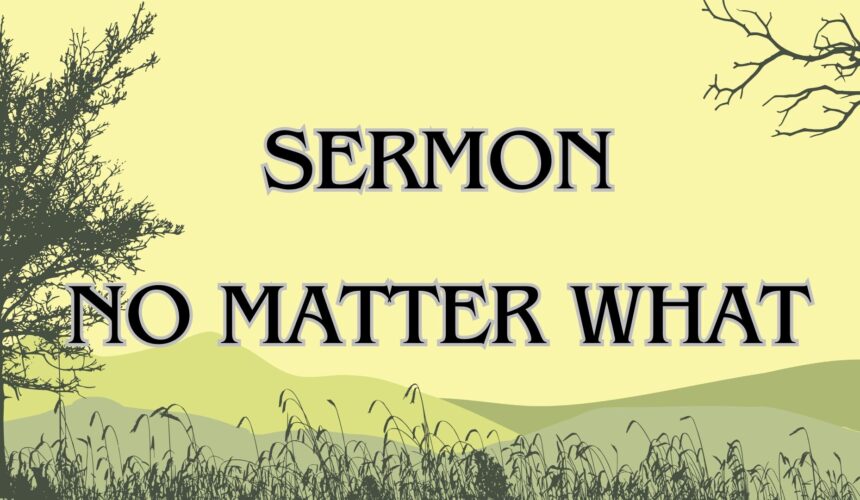No Matter What
University Park UMC
25th Sunday in Ordinary Time
November 10, 2024
Well, I’m pleased to announce this morning that after a long, hard-fought Presidential campaign we finally had an election on Tuesday. Fortunately, it went off pretty smoothly, without the violence and chaos that some of us had been concerned about, so that’s good.
Still – and I know this may come as a shock – it turns out that the world’s problems have not been solved in the past week. And I don’t think I’m going too far out on a limb when I say they won’t be solved in January or February or any time in 2025 And I’m probably not taking this whole thing too far when I say that we’re in for another exhausting four years of nonstop political and social fights; with most people across the political spectrum in a near-constant state of anger and outrage and fatigue – which is to say, the next four years will look a lot like the last eight. Donald Trump won the Presidential election in both the electoral and the popular vote, with the most recent tallies indicating that nationwide, about 2.7% more people voted for him than for Kamala Harris. So that means about half the country’s voters are happy with the results and pleased with the direction of our nation, and about half the country’s voters are profoundly disappointed and upset, and many people are scared about what comes next and everybody’s still mad and emotionally raw and having a nearly impossible time understanding those who believe differently than we do.
I don’t spend much time on social media. I know it can be really valuable, and I should be better at it, but I’m just not. I’m social media incompetent. I don’t use it much because I can’t imagine why anyone would care what I’m doing. I figure the world will be just fine without knowing that I’m eating a sandwich, or hearing my opinion about pop music or social justice or whatever it is. I’m not judging anybody who uses social media. I just usually don’t.
But I did spend a fair amount of time on Facebook and Instagram and Reddit after Tuesday of this past week. My friends – not just my Facebook friends or Instagram followers, but my actual face to face friends – run the gamut of political positions. So I turned to social media to get some sense of the range of reactions from people I know.
I guess I shouldn’t have been surprised that I saw the same responses among my friends that we’re seeing throughout the country. Some were jubilant and overjoyed. Some felt vindicated by the results and posted pictures I probably shouldn’t describe in church, but which clearly expressed their lasting resentment and anger at the losing side. Some were outraged by the results. Others were profoundly sad and disillusioned. Some were scared. I found the whole thing disheartening, but I can’t say it was unexpected. I imagine all of us probably feel some kind of way about the election. I’ve had a fair number of people contact me this week, Republicans and Democrats alike, just needing to talk and process the election and the state of our country and where we go from here.
I chose this morning’s scripture reading because at moments like this, when maybe we’re feeling lost and emotionally raw, or maybe we can’t understand why people can’t see what seems perfectly obvious to us, I think Isaiah has something powerful to say.
Most scholars agree that Isaiah was written by two different people in two very different times. The first part of the book, chapters 1 – 39, was probably written by a man named Isaiah, son of Amoz, about 750 years before the birth of Jesus. At that time, the Assyrian empire was the great power in the region, and it was growing by conquest. The Assyrians were taking new territory in the region. And even after the warnings of Isaiah and other prophets, in 722 BCE the Kingdom of Israel was conquered by the Assyrians.
Nobody knows who wrote the second part of the book, the part that goes from Chapter 40 – 66. But at chapter 40, a new author takes over, somebody who’s studied Isaiah’s writing and follows in his footsteps. But this time, the book addresses the situation almost 200 years later, now 550 years before Jesus – when the Holy Land had been taken over by the Babylonian Empire, and all the rulers and military leaders of Israel were marched off to Babylon as prisoners and exiles. And now when the story picks up at Chapter 40, the Babylonian Empire, after years of being the most powerful nation in the region, is about to be wiped out by Persia.
So it was nonstop, for God’s people. Exhausting doesn’t begin to describe it. In the ancient world, they were conquered by one empire after another after another. They were exiled from the land that God promised them. They lived in permanent instability.
And in that instability, the prophet writes to the people of God,
“thus says the Lord,
The One who created you, O Jacob,
who formed you, O Israel:
Do not fear, for I have redeemed you;
I have called you by name, you are mine.
When you pass through the waters, I will be with you;
and through the rivers, they shall not overwhelm you;
when you walk through fire you shall not be burned,
and the flame shall not consume you.
For I am the Lord your God,
the Holy One of Israel…and I love you.”
So in a turbulent, unsettling time, more than 2500 years ago – and in a turbulent, unsettling time right now, in the 21st century, with one power waning and another ready to take over, Isaiah 43 reminds us that we are not alone. It was true then, and it’s true now.
In fact, the insight that we are not alone is true now in two ways. If you’re part of this church, you’re part of a community that has embraced you. If you’re officially on our membership rolls, we’ve taken vows to you. Either way, we are committed to looking out for you. It is our vision for ministry, part of who we are, that we are committed to be an intergenerational, diverse, radically inclusive Christian community. You might be scared or bitter or angry or joyful after this election. But if you’re part of us, one thing you are not, is alone. In Christian community, we support each other. We listen to each other respectfully and deeply. We share our joys and our burdens. We are not alone. We’re committed to that ideal because we try to be followers of God. And as Isaiah 43 reminds us, God never abandons us. Ever. “You are mine,” says God, and I love you.”
Now I find that beautifully comforting. But I think there’s more to Isaiah’s words than we might pick up on a first reading. Because when Isaiah talks about the waters, and the river, and the fire, he’s not just using poetic metaphors for the trials we all undergo. Water and river and fire: I think those references come from specific moments in Israel’s history. I think “the waters” is a reference to Israel crossing the red sea to escape Pharoah’s army. I think “the river” points to the moment 40 years later when they cross the Jordan river to enter the Promised Land. And I’m pretty sure the fire comes from the story of the Jewish heroes Shadrach, Meshach, and Abednego, condemned by the King of Babylon to be thrown into a giant fire because they refuse to worship Babylon’s Gods.
In each one of these three stories, the people take risks and commit themselves to being God’s people. Fleeing Pharoah’s Army, they see the waters of the Red Sea part. And then comes the really hard part: they have to step onto the ocean floor and start walking, trusting that these walls of water will not simply crash in and drown them. 40 years later, they cross the Jordan river into the promised land at the time of year when the water is at its highest and most dangerous. They have to walk into a literal flood, striding into the rushing water, before the river finally stops so they can cross. And when the King commands Shadrach and Meshach and Abednego to worship the Golden statue he has made, they reply, “our God whom we serve is able to deliver us from the burning fiery furnace…but if not, be it known…, O king…we will not serve your gods…” Whether God saves them is immaterial. They refuse to bend the knee to Babylon’s Gods.
I think right now, no matter where we fall on our country’s political continuum, voices all around us are screaming at us, demanding that we bend the knee to Babylon’s Gods. They’re the Gods of domination, or wealth, or vengeance, or violence, or fear, or hatred, or alienation, or ideological purity, or Christian nationalism, or the desire to harm those with whom we disagree. And what all those Gods have in common is they tear us apart. Each one of them makes true community impossible. So the question is, with all these voices screaming at us, will we kneel?
There’s something Eric Smith, a church history professor over at the Iliff School of Theology, said once that’s stuck with me for years. This Christianity thing, it’s been around a long time. We’ve been doing this a long time. And a lot has changed over 2000 years. In fact, I’m not sure that a Christian from, say, the year 85 could walk into our Sanctuary today and recognize what we’re doing here as Christian worship. Things have changed. But if we’re faithful to what I believe is the core of the Gospel, then our basic job as Christians hasn’t changed much at all. We are called to lead faithful lives. Where people are treated unjustly, we say so and stand with them. Where cruelty is excused and given free reign, we create an alternative. Where people suffer, we care for them. Where they grieve, we comfort them. Where they are alone, we companion them. Where they are scared, we comfort and strengthen and stand with them. None of that has anything to do with who wins any election. None of it has anything to do with who the President is at any given moment. It’s just true, no matter who we voted for or where we stand politically. Because if we’re Christian, we are Christians first, citizens of a country second.
I don’t mean to say that whatever you feel – glad, mad, sad, scared, whatever it is – I don’ t mean to say your feelings about the election are wrong or illegitimate. They’re just how you feel, and how you feel is important. But I think over time, if we want to be involved in God’s Kindom work, we need to allow those feelings to move us into wise and compassionate action on God’s behalf to alleviate suffering. This is not easy. Jesus says the gate is small and the road is narrow. But I think that’s part of the reason we have churches: to support each other in the difficult, lifelong work of being the body of Christ for the world.
And even though it can get hard sometimes, God looks at us and says, “Do not fear. I am with you. You are mine. I love you.”


